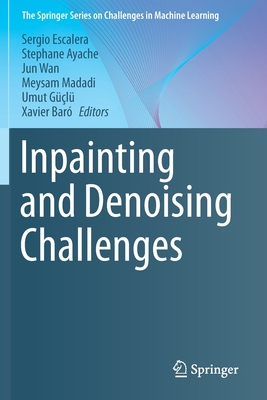Deep Learning and Missing Data in Engineering Systems
暫譯: 工程系統中的深度學習與缺失數據
Leke, Collins Achepsah, Marwala, Tshilidzi
- 出版商: Springer
- 出版日期: 2019-01-31
- 售價: $7,070
- 貴賓價: 9.5 折 $6,716
- 語言: 英文
- 頁數: 179
- 裝訂: Hardcover - also called cloth, retail trade, or trade
- ISBN: 3030011798
- ISBN-13: 9783030011796
-
相關分類:
DeepLearning
海外代購書籍(需單獨結帳)
商品描述
- deep autoencoder neural networks;
- deep denoising autoencoder networks;
- the bat algorithm;
- the cuckoo search algorithm; and
- the firefly algorithm.
The hybrid models proposed are used to estimate the missing data in high-dimensional data settings more accurately. Swarm intelligence algorithms are applied to address critical questions such as model selection and model parameter estimation. The authors address feature extraction for the purpose of reconstructing the input data from reduced dimensions by the use of deep autoencoder neural networks. They illustrate new models diagrammatically, report their findings in tables, so as to put their methods on a sound statistical basis. The methods proposed speed up the process of data estimation while preserving known features of the data matrix.
This book is a valuable source of information for researchers and practitioners in data science. Advanced undergraduate and postgraduate students studying topics in computational intelligence and big data, can also use the book as a reference for identifying and introducing new research thrusts in missing data estimation.
商品描述(中文翻譯)
《深度學習與工程系統中的缺失數據》使用深度學習和群體智慧方法來處理工程系統中的缺失數據估計。本書提出的缺失數據估計過程可應用於圖像識別和重建。為了促進缺失數據的填補,書中介紹了幾種人工智慧方法,包括:
- 深度自編碼神經網絡(deep autoencoder neural networks);
- 深度去噪自編碼網絡(deep denoising autoencoder networks);
- 蝙蝠演算法(bat algorithm);
- 布穀鳥搜尋演算法(cuckoo search algorithm);
- 螢火蟲演算法(firefly algorithm)。
所提出的混合模型用於在高維數據環境中更準確地估計缺失數據。群體智慧演算法被應用於解決關鍵問題,例如模型選擇和模型參數估計。作者針對特徵提取進行探討,旨在通過使用深度自編碼神經網絡從降維後的數據重建輸入數據。他們以圖示方式展示新模型,並在表格中報告其研究結果,以便將其方法建立在穩健的統計基礎上。所提出的方法加速了數據估計的過程,同時保留了數據矩陣的已知特徵。
本書對於數據科學領域的研究人員和實務工作者來說,是一個寶貴的信息來源。高年級本科生和研究生在學習計算智能和大數據相關主題時,也可以將本書作為識別和引入缺失數據估計新研究方向的參考資料。
作者簡介
Tshilidzi Marwala is the Vice-Chancellor and Principal of the University of Johannesburg. He was previously the Deputy Vice-Chancellor for Research and Internationalisation as well as Dean of Engineering and the Built Environment at the University of Johannesburg. Prior to that he was the Adhominem Professor of Electrical Engineering as well as the Carl and Emily Fuchs Chair of Systems and Control Engineering at the University of the Witwatersrand. He is a Fellow of The World Academy of Sciences of the Developing World (TWAS) as well as a distinguished member of the ACM. He holds a Bachelor of Science in Mechanical Engineering from Case Western Reserve University, USA, a Master of Engineering from the University of Pretoria, South Africa, and a PhD in Engineering from the University of Cambridge, UK. He was a postdoctoral research associate at the Imperial College of Science, Technology and Medicine, and a visiting fellow at Harvard University and Cambridge University.
Collins Leke holds a PhD and Master's degrees from the University of Johannesburg. He also holds a Bachelor's degree in Computer Science and Applied Mathematics from the University of the Witwatersrand. His research interests include the application of machine learning and computational intelligence to electrical and biomedical engineering, as well as in finance and insurance.
作者簡介(中文翻譯)
Tshilidzi Marwala 是約翰尼斯堡大學的副校長及校長。他曾擔任約翰尼斯堡大學的研究與國際化副校長,以及工程與建築環境學院的院長。在此之前,他是威特沃特斯蘭德大學的電機工程特聘教授,以及系統與控制工程的卡爾與艾米莉·福克斯講座教授。他是發展中國家科學院(TWAS)的院士,也是ACM的傑出會員。他擁有美國凱斯西儲大學的機械工程學士學位、南非比勒陀利亞大學的工程碩士學位,以及英國劍橋大學的工程博士學位。他曾在帝國理工學院擔任博士後研究助理,並在哈佛大學和劍橋大學擔任訪問研究員。
Collins Leke 擁有約翰尼斯堡大學的博士及碩士學位。他還擁有威特沃特斯蘭德大學的計算機科學與應用數學學士學位。他的研究興趣包括機器學習和計算智能在電氣工程、生物醫學工程以及金融和保險領域的應用。











